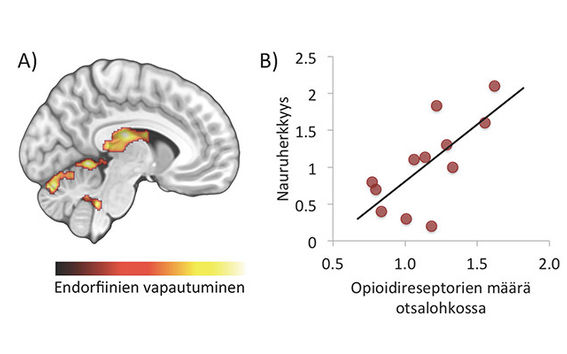Laughter releases endorphins in the brain

Researchers from Aalto University, the Turku PET Centre, and Oxford University have demonstrated that laughter induces the release of endorphins in the human brain. This can help people form and maintain social relationships.
'Laughter-induced release of endorphins may be an important mechanism that supports the formation, strengthening and maintaining of social relationships. The pleasure and relaxation caused by the release of endorphins emphasise a feeling of safety. The link between the amount of opioid receptors and the likelihood to laugh demonstrates that individual differences in people sociability can be due to differences in the way our opioid systems function,' says Lauri Nummenmaa from the Turku PET Centre.
Laughter caused feelings of pleasures and relaxation, and released endorphins in the areas of the brain that participated in the regulation of alertness and emotions. The more opioid receptors there were in the test subject's brain, the more the subject also laughed during the study.
"The results of our new study highlight the important neurochemical mechanisms of the brain that attach us to others when we are safe and laughing together. We tend to have a positive view of people who we can laugh with. However, how sensitive we are in social situations is individual-specific and this is also partly explained by the differences in our brains' neurochemistry,' Professor Mikko Sams from Aalto University adds.
'Many monkey species maintain social relationships by grooming each other's fur, which is known to release endorphins. However, this type of one-on-one grooming is slow. As laughter induces the same type of release of endorphins, it facilitates the formation of notably larger social networks. Laughter is very contagious, which means that endorphins are released and the feeling of social belonging increases when people laugh together,' explains Professor Robert Dunbar from Oxford University, who is currently a visiting professor at Aalto University.
The research was carried out using positron emission tomography i.e. PET imaging. A small amount of radioactive tracer was administered into the test subjects' bloodstream, which then binds with the brain's opioid receptors. The breakdown of the tracer in the brain was measured with a PET camera twice: after laughing with friends as well as after a moment spent alone in the laboratory.
The results of the study were published in The Journal of Neuroscience.
The study was funded by the Academy of Finland and the European Research Council.
Further information:
Mikko Sams
Professor
Aalto University
mikko.sams@aalto.fi
tel. +358 50 521 5739
Lauri Nummenmaa
Professor
Turku PET Centre
latanu@utu.fi
tel. +358 50 431 9931
Read more news

Apply Now: Unite! Visiting Professorships at TU Graz
TU Graz, Austria, invites experienced postdoctoral researchers to apply for two fully funded visiting professorships. The deadline for expressions of interest is 20 February 2026, and the positions will begin on 1 October 2026.Soil Laboratory Exhibition – Exploring the Dialogue Between Human and the Earth in Utsjoki
Soil Laboratory explores the relationship between humans and the earth as a living landscape through ceramic practices in Utsjoki.
The Finnish Cultural Foundation awarded grants for science and art
A total of 15 individuals or groups from Aalto University received grants






